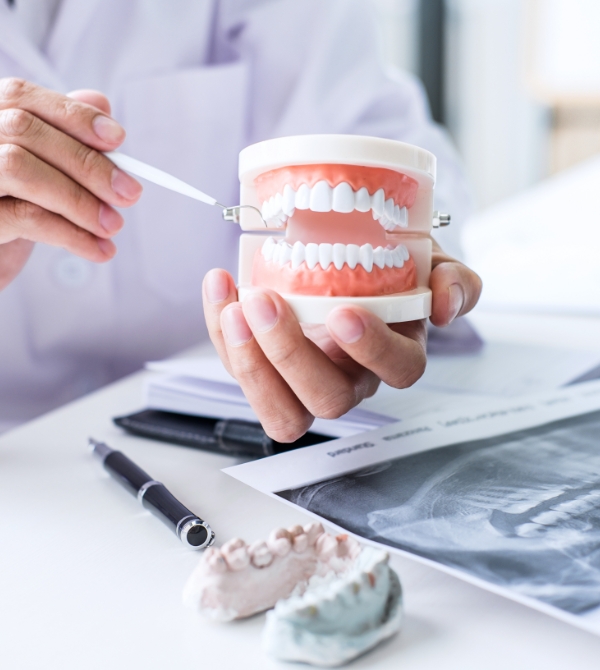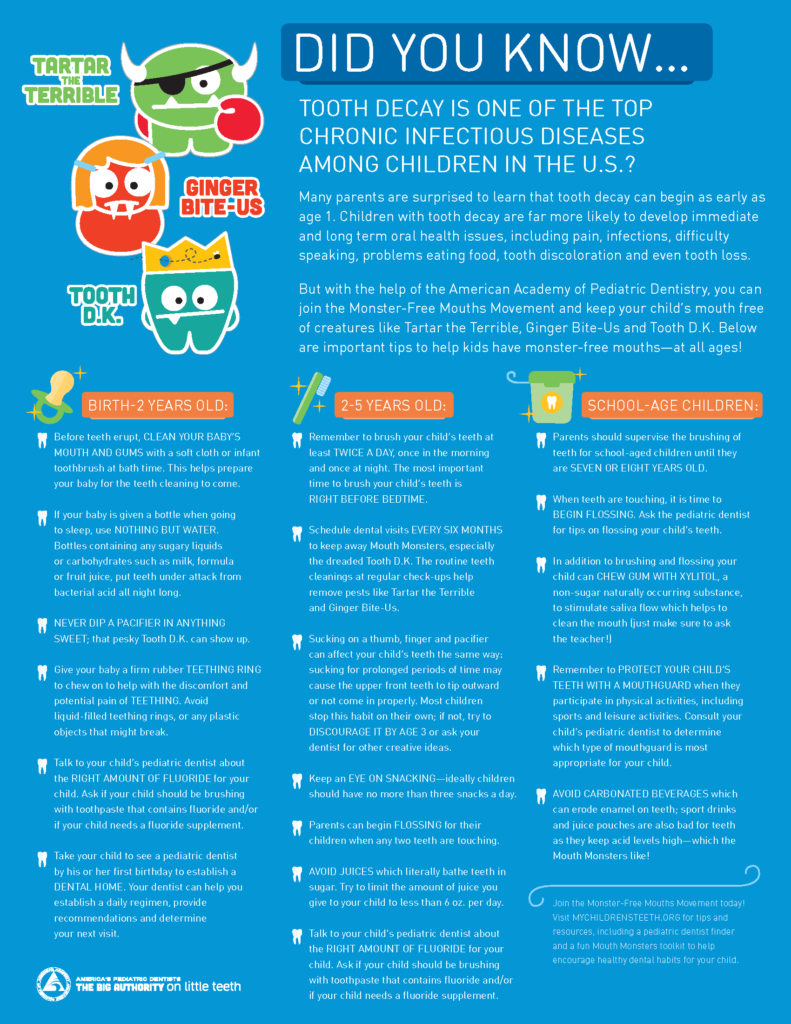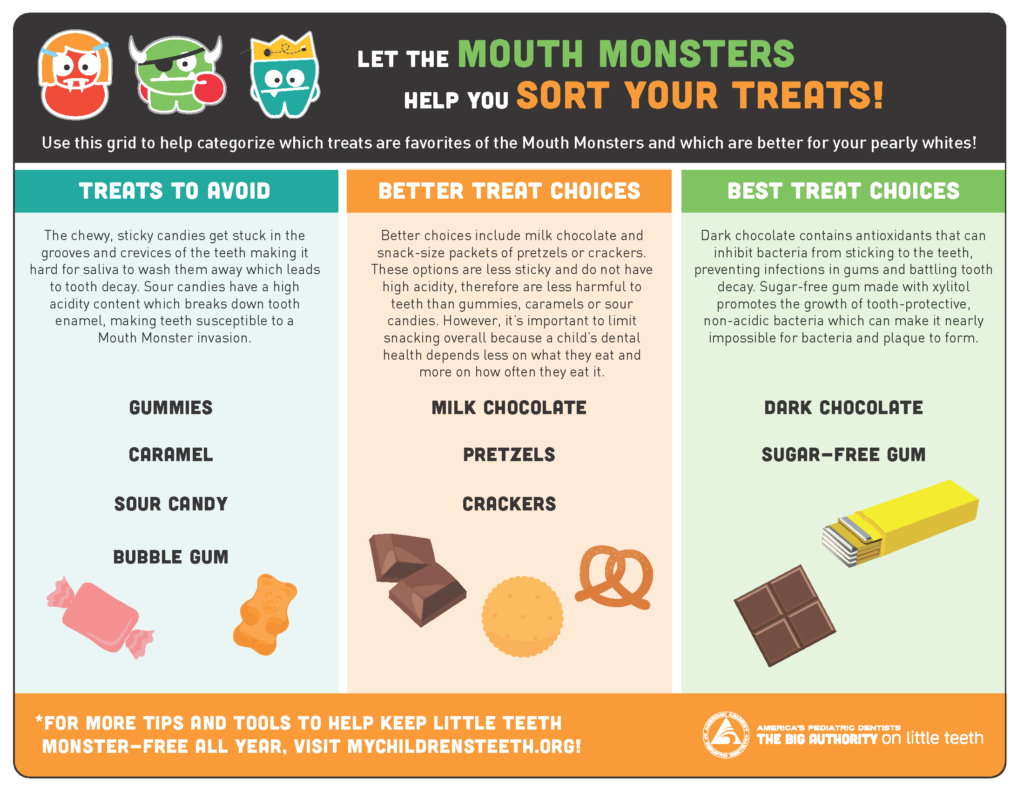
10 Reasons to choose a
Pediatric Dentist
- Doctors are specially trained in diagnosing and treating the unique problems of children and adolescents.
- The focus is on prevention of dental problems to ensure a lifetime of good dental health.
- Office is “child-friendly” with a playroom and a welcoming décor.
- Staff is experienced, trained and sensitive to working with children and their parents.
- When children see other children having a positive experience, they have a positive model to follow.
- Committed to caring for all children including those with special health care needs (SHCN). Office is handicap accessible and routinely accommodates SHCN patients.
- Experienced in lip and tongue-tie in infants to aid feeding.
- Recognize and treat problems of growth and development general dentists might not recognize, plus some dentists aren’t comfortable treating very young children, which postpones treatment until it’s too late to correct.
- Doctors have extensive experience in administering sedation options for the anxious child to provide safe and comprehensive care.
- Extensive training in pediatric dental trauma and the ability to accomodate dental emergencies.

Dental Care Overview
Care Concerns
It is important for us to establish a good relationship with both patients and parents. We especially want our young patients to feel comfortable with our doctor and staff in our office setting. Early regular visits to the pediatric dentist will build a trust that will help young children prepare for a lifetime of good dental check-ups. We make a concerted effort to make your visit as enjoyable as possible. Our goal is to provide a great appointment experience with outstanding service. Our doctors and staff maintain the highest standards in pediatric dental care. If you have any questions or concerns, please do not hesitate to contact us.
Infants and Children
The beginning of a child’s dental care program is crucial. The foremost concern is establishing a program of preventive dental care. It is also important to get the facts about early childhood caries (also known as baby bottle syndrome), a risk for every child but one that can be prevented. Ask us about thumb, pacifier and bottle habits. We’ll provide you with a wealth of information about your child’s growth and development.

Adolescents and Young Adults
There are many factors that make the pre-teen and teenage years an important stage for dental care. Eating patterns may become slightly irregular and frequent snacking on unhealthy foods often becomes the norm. It is normal that self-esteem and confidence issues may arise, and these are directly related to appearance and self-image. Our office takes these issues into consideration, and we are extra sensitive to the needs of teenagers.

12 to 24 Months
During this stage of development most primary teeth have erupted. Many parents are surprised to learn that tooth decay can begin as early as age 1. Children with tooth decay are far more likely to develop immediate and long term oral health issues, including pain, infections, difficulty speaking, problems eating food, tooth discoloration and even tooth loss.
- Weaning from the breast or bottle by 12 months of age is advised.
- We recommend visiting our pediatric dentist every 6 months for an exam and cleaning.
- A pea-sized portion of fluoride toothpaste may be used when a child is able to rinse and spit.
But with the help of the American Academy of Pediatric Dentistry, you can join the Monster-Free Mouths Movement and keep your child’s mouth free of creatures like Tartar the Terrible, Ginger Bite-Us and Tooth D.K. Below are important tips to help kids have monster-free mouths—at all ages!
Dental Care by Age
Birth to 6 months
- Even before their first tooth appears, infants should have their gums cleaned with gauze or an infant washcloth after feedings and at bedtime.
- Avoid putting your baby to bed with a bottle.
- If you need to, give them a bottle with only water
- Bottles containing any sugary liquids or carbohydrates such as milk, formula or
- Fruit juice, put teeth under attack from bacterial acid all night long.
- If you need to, give them a bottle with only water
- Talk to your child’s pediatric dentist about the right amount of fluoride for your child. Ask if your child should be brushing with toothpaste that contains fluoride and/or if your child needs a fluoride supplement.
6 to 12 months
- When a child’s first tooth begins to appear it is time to visit the pediatric dentist for a check-up.
- Begin brushing with a soft-bristled brush after feedings and at bedtime.
- Be especially alert to potential dental injuries when your child begins to walk.
2 – 5 Years Old
- Remember to brush your child’s teeth at least twice a day, once in the morning and once at night. The most important time to brush your child’s teeth is right before bedtime.
- Schedule dental visits every six months to keep away mouth monsters, especially the dreaded Tooth D.K. The routine teeth cleanings at regular check-ups help remove pests like Tartar the Terrible and Ginger Bite-Us.
- Sucking on a thumb, finger and pacifier can affect your child’s teeth the same way: sucking for prolonged periods of time may cause the upper front teeth to tip outward or not come in properly. Most children stop this habit on their own; if not, try to discourage it by age 3 or ask your dentist for other creative ideas.
- Parents can begin flossing for their children when any two teeth are touching.
Avoid juices which literally bathe teeth in sugar. Try to limit the amount of juice you give to your child to less than 6 oz. Per day. - Talk to your child’s pediatric dentist about the right amount of fluoride for your child. Ask if your child should be brushing with toothpaste that contains fluoride and/or if your child needs a fluoride supplement.
- Keep an eye on snacking—ideally children should have no more than three snacks a day. See below for a chart to help with snacking
FAQs
What do I do if a baby tooth is knocked out?
Contact your pediatric dentist as soon as possible. Quick action can lessen a child’s discomfort and prevent infection. Rinse the mouth with water and apply cold compresses to reduce swelling.
Spend time comforting the child rather than looking for the tooth. Remember, baby teeth should not be replanted because of potential damage to developing permanent teeth.
What do I do if my child chips or breaks a tooth?
Contact your pediatric dentist immediately. Fast action can save the tooth, prevent infection and reduce the need for extensive dental treatment.
Rinse the mouth with water and apply cold compresses to reduce swelling. If a parent can find the broken tooth fragment, it is important to take it to the dentist.
What do I do if a permanent tooth is knocked out?
Find the tooth. Rinse it gently in cool water. do not scrub it or use soap. Replace the tooth in the socket and hold it there with clean gauze or a wash cloth. If you cannot put the tooth back in the socket, place the tooth in a clean container, preferably with cold milk. If milk is not available, put it in a container with the child’s saliva, but not in water.
Take the child and the tooth to your pediatric dental office immediately or call the emergency number if it is after hours.
How can I prevent tooth injuries if my children are involved in activities with risk of falling
Have your child wear a mouth guard when activity involves a risk of falls, collisions or contact with hard surfaces or equipment. pre-formed mouth guards can be purchased in sporting goods stores, or customized mouth guards can be made by a pediatric dentist.

Did You Know?
What Causes tooth decay?
- Bacteria that live on teeth consumes sugar and then uses it to manufacture acids
- The acids dissolve teeth
- The dissolved tooth becomes infected
- This infection is called decay
The leading causes of cavities are a diet of high sugars and lack of brushing and flossing. The longer your child chews on their food, the longer the residue stays on their teeth, the more acid forms and the greater the chances of cavities.
Four things are necessary for cavities to form:
- a tooth
- bacteria
- sugars or other carbohydrates, and
- time.
Pedodontics is the branch of dentistry dealing with the teeth and mouth conditions of children. Pediatric dentistry is the specialty of dentistry that focuses on the oral health and unique needs of young people.
It is very important that primary teeth are kept in place until they are lost naturally. These teeth serve a number of critical functions.
Children should be weaned from the bottle at 12-14 months of age.
Parental involvement is extremely important. Prepare your child for their first visit by reinforcing a positive attitude:
- Playing pretend dentist
- Reading books that involve a dental visit
It is very important to care for your young child’s teeth. Early Childhood Caries (ECC), or tooth decay can affect a child’s body weight, growth and the overall quality of life of a child.

